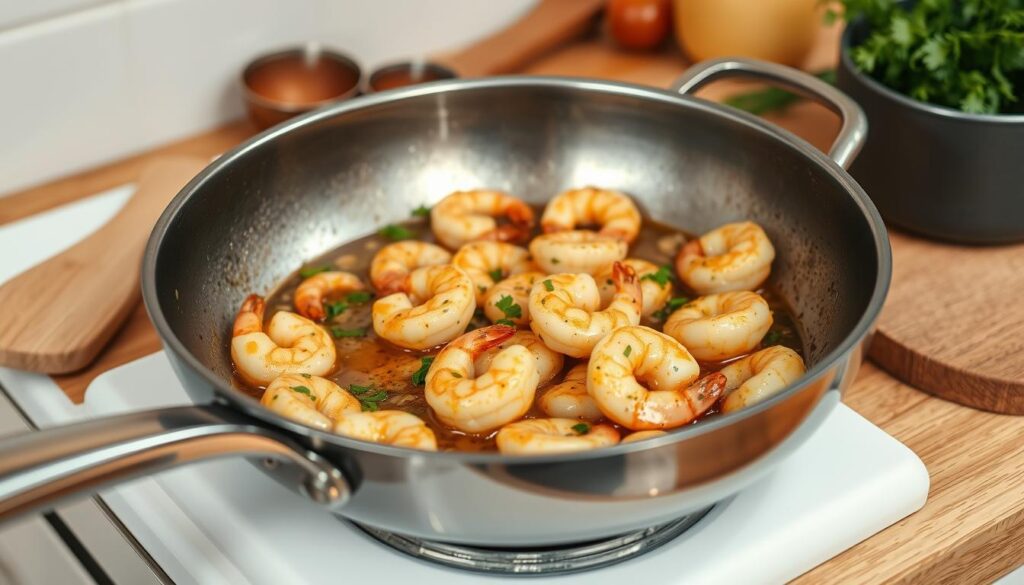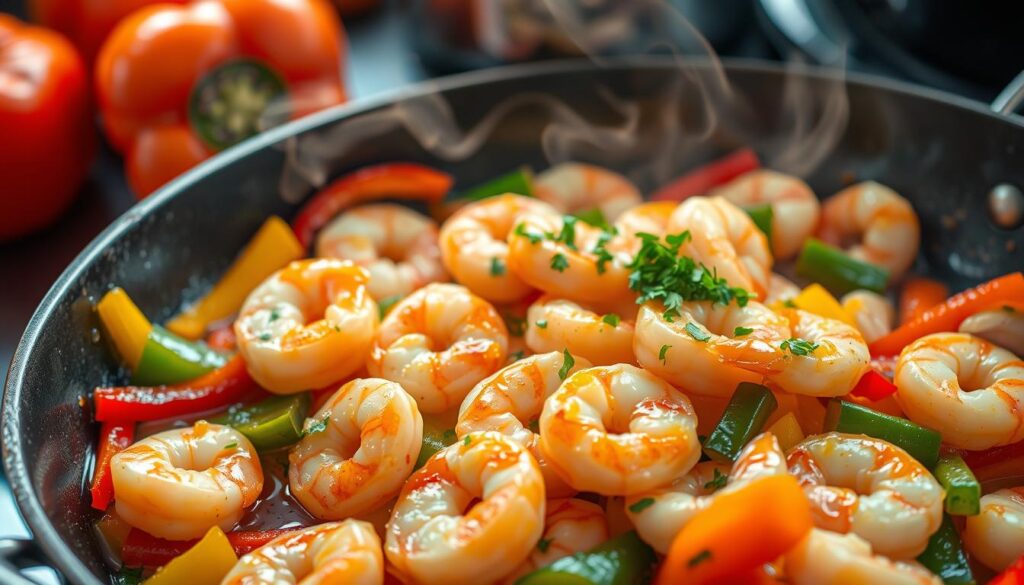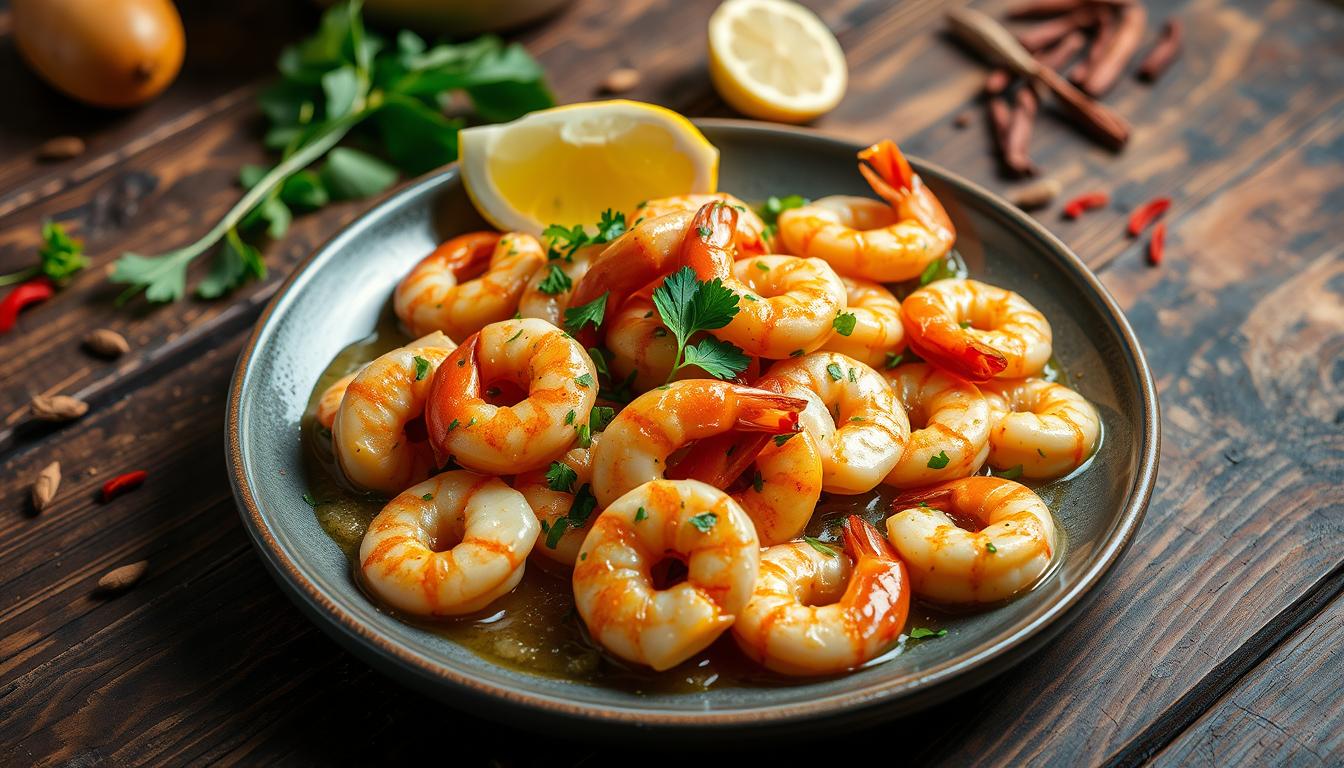Craving a quick, delicious seafood recipe that willlpressesss your family and friends? Sautéed shrimp is the perfect solution. This versatile dish transforms simple ingredients into a restaurant-quality meal in just 15 minutes, making it ideal for busy weeknights or spontaneous dinner parties.
With minimal preparation and cooking time, sautéed shrimp offers a delectable seafood experience that’s both elegant and approachable. Whether a novice or a seasoned chef, this recipe will elevate your culinary skills and satisfy your seafood cravings.
Table of Contents
What is Sautéed Shrimp?
Sautéed shrimp is a delicious culinary technique that transforms simple seafood into a mouthwatering dish. It involves quickly preparing shrimp in a hot pan with a small amount of fat, creating a golden, flavorful exterior while maintaining the shrimp’s tender interior.
Definition and Cooking Technique
Sautéing is a precise cooking method that requires high heat and minimal oil. When preparing sauteed shrimp, you’ll typically follow these key steps:
- Use large or extra-large shrimp (31-40 pieces per pound)
- Pat shrimp dry to ensure proper browning
- Cook for 2 minutes per side at medium-high heat
- Use 3 tablespoons of olive oil or butter
The beauty of garlic butter shrimp lies in its simplicity. You lock in natural flavors and create a delightful caramelized surface by cooking shrimp quickly over high heat.
History and Origin of Sautéed Shrimp
Sautéed shrimp is a staple of various global cuisines, and coastal regions have developed unique preparation methods. Fishermen and home cooks have discovered that quick, high-heat cooking preserves shrimp’s delicate texture while enhancing its natural sweetness.
“Sautéing is an art of quick cooking that transforms ordinary ingredients into extraordinary meals.” – Culinary Expert
Today, sauteed shrimp remains a popular dish. Its versatility and rapid preparation time—less than 10 minutes—make it ideal for home cooks and professional chefs. Mastering this technique opens up a world of delicious possibilities.
Benefits of Cooking Shrimp
Dive into the world of delicious and nutritious seafood recipes, including easy shrimp dishes. Shrimp is a powerhouse of health benefits, and these dishes are tasty and packed with essential nutrients to boost overall well-being.
Nutritional Powerhouse of Shrimp
Shrimp is an incredible protein source that delivers maximum nutrition with minimal calories. A 3-ounce serving contains just 84 calories while providing an impressive 20 grams of protein. This makes shrimp an excellent choice for those seeking lean protein in their easy shrimp dishes.
Essential Nutrients in Shrimp
- Selenium: Supports immune function
- Vitamin B12: Promotes brain health
- Copper: Supports metabolism
- Omega-3 fatty acids: Reduces inflammation
Health Benefits of Consuming Shrimp
Seafood recipes featuring shrimp offer numerous health advantages. Research indicates potential benefits, including:
- Improved heart health
- Enhanced brain development
- Weight management support
| Nutrient | Amount per 3-oz Serving | Percentage of Daily Value |
|---|---|---|
| Protein | 20.4 grams | 41% |
| Iron | 0.433 mg | 2.4% |
| Potassium | 220 mg | 4.7% |
| Zinc | 1.39 mg | 12.6% |
“Shrimp offers a nutritional profile that can support a balanced and healthy diet” – Nutrition Experts
When preparing easy shrimp dishes, remember that cooking methods matter. Steaming or boiling helps preserve nutrients while keeping calories low. The Dietary Guidelines for Americans recommend consuming 8 ounces of low-mercury seafood like shrimp weekly.
Pro tip: Choose wild-caught or responsibly farmed shrimp to maximize nutritional benefits and support sustainable seafood practices.
Essential Ingredients for Sautéed Shrimp
Creating the perfect sautéed shrimp starts with selecting the right ingredients. Whether you’re preparing a classic shrimp scampi or a zesty lemon garlic shrimp, the quality of your ingredients can make or break your dish.
Selecting the Perfect Shrimp
Choosing the right shrimp is crucial for your culinary success. Consider these key factors when selecting your seafood:
- Size matters: Extra-large shrimp (21-2countssnt per pound) work best for sautéing
- Fresh is best: Look for firm, translucent shrimp with a mild ocean scent
- Frozen can be great: Keep frozen shrimp on hand for quick meals
Essential Cooking Oils and Aromatics
Your lemon garlic shrimp will shine with the right cooking oils and flavor enhancers. Here’s what you’ll need:
- Unsalted butter (2 tablespoons): Provides rich flavor for shrimp scampi
- Olive oil (1 tablespoon): Prevents butter from browning too quickly
- Garlic (6 cloves): Key to achieving that classic lemon garlic shrimp taste
“The secret to great sautéed shrimp lies in fresh ingredients and careful preparation.”
Pro tip: Enhance your dish with these seasonings:
- Kosher salt (½ teaspoon)
- Freshly cracked black pepper (¼ teaspoon)
- Smoked paprika (¼ teaspoon)
- Garlic powder (¼ teaspoon)
Your shrimp will be packed with flavor and nutrition. A single serving offers 22.8 grams of protein with just 128 calories. Peeling your shakes can help reduce ingredient costs, making this a budget-friendly and delicious meal option.
Tools You Need for Sautéing Shrimp
Creating delicious sautéed shrimp requires more than just fresh ingredients. The right tools can transform your cooking experience and help you craft easy shrimp dishes with professional results.

Preparing sautéed shrimp involves selecting the perfect cookware and utensils, making the cooking process smooth and enjoyable.
Recommended Cookware for Perfect Sautéed Shrimp
When making sautéed shrimp, your choice of cookware can significantly impact the final dish. Here are the top recommended pans:
- Stainless Steel Skillet: Provides even heat distribution
- Cast Iron Skillet: Offers excellent heat retention
- Non-Stick Pan: Helps prevent shrimp from sticking
| Pan Type | Heat Distribution | Best For |
|---|---|---|
| Stainless Steel | Excellent | Crispy sautéed shrimp |
| Cast Iron | Superior | High-heat searing |
| Non-Stick | Good | Delicate shrimp recipes |
Essential Utensils for Easy Shrimp Dishes
To master sautéed shrimp, you’ll need a few key utensils:
- Tongs: For precise shrimp handling
- Spatula: Helps with flipping and moving shrimp
- Kitchen Timer: Ensures perfect cooking time
- Meat Thermometer: Checks internal shrimp temperature
“The right tools can turn an ordinary meal into an extraordinary culinary experience.” – Culinary Expert
Investing in quality cookware and utensils will elevate your sautéed shrimp game, making cooking fun and effortless.
Step-by-Step Guide to Sautéed Shrimp
Preparing delicious sauteed shrimp at home is easier than you might think. With the right technique, you can create a mouthwatering meal that impresses family and friends in just minutes.
Preparing Shrimp for Cooking
Before you start cooking garlic butter shrimp, proper preparation is crucial. Follow these essential steps:
- Pat shrimp completely dry with paper towels
- Remove shells and devein if necessary
- Season with salt and pepper
- Let shrimp sit at room temperature for 10 minutes
Mastering the Sautéing Technique
The key to perfect sauteed shrimp lies in understanding the cooking process. Use a medium to large skillet and follow these guidelines:
| Cooking Parameter | Recommended Setting |
|---|---|
| Heat Setting | Medium-high |
| Cooking Time | 1-2 minutes per side |
| Total Cooking Duration | 2-4 minutes |
| Shrimp Doneness | Pink and opaque |
“The secret to great sauteed shrimp is high heat and quick cooking.” – Professional Chef
For garlic butter shrimp, add minced garlic and butter during the last minute of cooking. This technique ensures maximum flavor without burning the delicate ingredients.
- Heat olive oil and butter in a skillet
- Add seasoned shrimp in a single layer
- Cook until pink, about 2 minutes per side
- Add minced garlic in the final minute
- Remove from heat immediately
Practice these steps, and you’ll master sauteed shrimp that’s tender, flavorful, and perfectly cooked every time.
Flavor Enhancements for Sautéed Shrimp
Transforming your sautéed shrimp from simple to spectacular requires understanding the art of flavor enhancement. You can elevate your dish to restaurant-quality deliciousness with the right herbs, spices, and sauces.
Herbs and Spices That Shine
Selecting the perfect herbs and spices can dramatically improve your shrimp dishes. Consider these top flavor boosters:
- Old Bay Seasoning (contains 18 unique spices)
- Fresh thyme leaves
- Cajun spice blend
- Smoked paprika
- Garlic powder
Marinades and Sauces for Incredible Taste
Shrimp fajitas and cajun shrimp pasta lovers know that marinades can transform a simple seafood dish. Try these flavor-packed options:
| Sauce Type | Flavor Profile | Recommended Quantity |
|---|---|---|
| Lemon Butter | Bright, Rich | 4 tablespoons |
| Worcestershire Sauce | Tangy, Deep | 3/4 teaspoon |
| Tabasco | Spicy | 4 dashes |
“The secret to amazing shrimp is balancing bold flavors without overwhelming the delicate seafood.” – Culinary Expert
Remember that seasoning is an art when preparing cajun shrimp pasta or fajitas. Start with small amounts and adjust to your taste preferences. A pinch of spice can transform your entire dish.
Creative Serving Suggestions
Sautéed shrimp offers incredible versatility for home cooks looking to create memorable meals. Your culinary creativity can transform this delectable protein into numerous exciting dishes that delight family and friends.
Pairing with Side Dishes
Selecting the perfect side dish can elevate your sautéed shrimp from good to extraordinary. Consider these fantastic pairings:
- Cilantro lime rice
- Roasted vegetables
- Quinoa salad
- Garlic bread
Creative Plating Ideas
Presentation matters when serving shrimp taco recipes or coconut shrimp. Experiment with these innovative plating techniques:
- Arrange shrimp in a circular pattern
- Use colorful garnishes
- Serve on rustic wooden boards
- Create height with layered ingredients
| Dish Type | Recommended Serving Style |
|---|---|
| Shrimp Tacos | Soft tortillas toppedwith fresh salsa |
| Coconut Shrimp | Plated with dipping sauce, garnished with lime wedges |
| Mediterranean Style | Over herb-infused couscous |
“The art of cooking is not just about taste, but also about visual appeal.” – Culinary Expert
With these creative serving suggestions, yourautéed shrimp can become a show-stopping meal. Whether preparing shrimp taco recipes or exploring coconut shrimp variations, remember that presentation and thoughtful pairings can transform a simple dish into a culinary masterpiece.
Common Mistakes to Avoid
Mastering easy shrimp dishes requires understanding potential pitfalls. Knowing how to avoid common cooking errors can transform your sautéed shrimp from mediocre to magnificent.

Overcooking: The Biggest Culinary Sin
Overcooking shrimp is the most critical mistake home cooks make. When shrimp cook too long, they become tough and rubbery, losing their delicate texture and nutritional value. Research shows excessive heat can damage up to 50% of the shrimp’s natural moisture and nutrients.
- Cook shrimp for 2-3 minutes per side
- Watch for a bright pink color as a doneness indicator
- Remove from heat immediately when shrimp curl
Seasoning Secrets for Perfect Sautéed Shrimp
Inadequate seasoning can turn potentially delicious sautéed shrimp into bland disappointments. Professional chefs recommend using 3-5 key ingredients to enhance flavor profiles.
“The difference between good and great shrimp is in the seasoning” – Culinary Expert
- Pat shrimp dry before season.ng
- Use fresh herbs and spices
- Allow a minimum 1-hour marinating time
- Balance salt, acid, and aromatics
Avoiding these common mistakes will create restaurant-quality sautéed shrimp that impress your family and friends.
Sautéed Shrimp Variations
Ready to explore the exciting world of sautéed shrimp? Different culinary traditions offer amazing ways to transform this delicious seafood into mouthwatering dishes that will tantalize your taste buds.
Shrimp scampi represents a classic Italian-American preparation that showcases the versatility of sautéed shrimp. This delectable dish typically combines garlic, butter, white wine, and fresh herbs to create a rich and flavorful experience.
Global Style Recipes
Discover international sautéed shrimp variations that bring unique flavors to your kitchen:
- Shrimp fajitas with Mexican-inspired spices
- Asian-style sautéed shrimp with ginger and soy sauce
- Mediterranean shrimp with oregano and lemon
- Cajun-spiced sautéed shrimp
Dietary Adaptations
Sautéed shrimp can easily accommodate various dietary requirements:
- Gluten-free: Use cornstarch instead of flour for coating
- Low-carb: Skip breading and focus on herbs and spices
- Keto-friendly: Cook with extra butter or olive oil
- Paleo: Use ghee or coconut oil for cooking
“The beauty of sautéed shrimp is its incredible adaptability to different cuisines and dietary needs.” – Culinary Expert
With just a few simple ingredient swaps, you can transform your shrimp scampi or fajitas into a dish that meets your nutritional goals.
Storing Leftover Sautéed Shrimp
After enjoying delicious seafood recipes, knowing how to properly store your easy shrimp dishes is crucial. sautéed shrimp can be a tasty treat when handled with care.
Refrigeration Techniques
Preserving the quality of your sautéed shrimp requires careful storage. Use airtight containers to maintain freshness and prevent bacterial growth. Cooked shrimp can safely remain in the refrigerator for 3-4 days.
- Store in shallow, sealed containers
- Keep refrigerator temperature below 40°F
- Place shrimp in the coldest part of the refrigerator
Freezing Leftover Shrimp
Freezing offers an excellent option for extending the life of your sautéed shrimp. Proper packaging is key to maintaining flavor and texture.
| Storage Method | Duration | Best Practices |
|---|---|---|
| Refrigerator Storage | 3-4 days | Use airtight containers |
| Freezer Storage | Up to 3 months | Wrap tightly in freezer-safe bags |
Reheating Tips for Perfect Texture
Reheating seafood recipes requires a gentle touch. Use low heat and quick warming to avoid overcooking your easy shrimp dishes.
- Thaw frozen shrimp in the refrigerator. a tor
- Use low heat when reheating
- Add a splash of water to prevent drying
- Heat for no more than 1-2 minutes
“The key to great leftover shrimp is gentle reheating and careful storage.”
Remember, food safety is paramount. Always check for signs of spoilage before consuming stored seafood. When in doubt, discard leftovers to prevent potential foodborne illness.
Conclusion: Enjoying Your Sautéed Shrimp
Your culinary journey with sautéed shrimp doesn’t end here. These quick seafood recipes offer an exciting opportunity to explore diverse flavors and cooking techniques in your kitchen. With just 20 minutes of total cooking time, you can transform simple ingredients into a delectable meal that impresses family and friends.
The versatility of sautéed shrimp makes it perfect for home cooks seeking convenient and nutritious dinner options. Whether following a gluten-free, low-carb, or paleo-friendly diet, these recipes adapt beautifully to your nutritional needs. Experiment with different seasonings, vegetables, and sauces to create unique seafood recipes that reflect your taste.
Final Tips for a Perfect Meal
Remember the key principles: use fresh ingredients, pay attention to cooking times, and don’t hesitate to customize. Your sautéed shrimp can be a canvas for culinary creativity. From Asian-inspired stir-fries to Mediterranean-style dishes, the possibilities are endless. Start with basic techniques, and you’ll craft restaurant-quality food recipes in your kitchen.
kiKitchen Cemento Experiment with Recipes
Embrace the adventure of cooking. Each time you prepare sautéed shrimp, you’ll gain confidence and skill. Keep exploring new flavor combinations, techniques, and ingredients. Your next favorite dish might be just one sauté pan away!
FAQ
How long does it take to sauté shrimp?
What’s the best pan for sautéing shrimp?
Should I remove the shrimp tail before cooking?
How do I know when shrimp are fully cooked?
Can I use frozen shrimp for sautéing?
What are some easy seasoning options for sautéed shrimp?
How many shrimp should I serve per person?
Can I prepare sautéed shrimp ahead of time?
Your Thoughts on This Recipe?
There are no reviews yet. Be the first one to write one.

